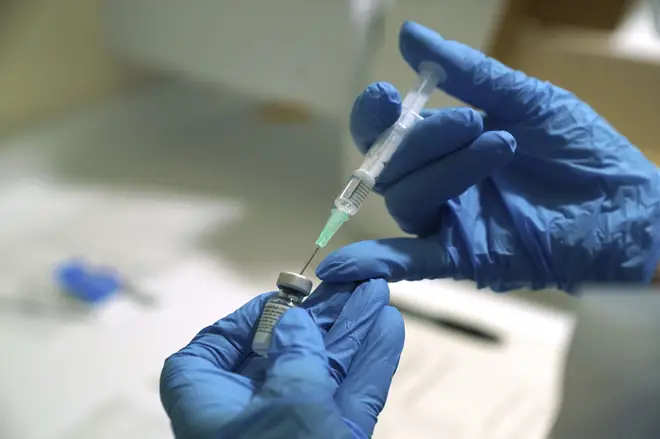
Ian Payne 4am - 7am
9 December 2020, 09:50 | Updated: 9 December 2020, 18:07

Two NHS staff members who received the Pfizer/BioNTech vaccine on Tuesday - the first day of the mass vaccination programme - are recovering well after suffering an allergic reaction.
It is understood that both the staff members had a significant history of allergic reactions - to the extent where they need to carry an adrenaline auto injector with them.
They developed symptoms of "anaphylactoid reaction" shortly after receiving the vaccine and both have recovered after the appropriate treatment.
Following the incident, regulators issued a warning that people who have a history of "significant" allergic reactions should not currently receive the jab following the incident.
Read more: Covid vaccine: GP's advice for people with allergies
Read more: Who can't have the Covid-19 vaccine and why?
The NHS in England said all trusts involved with the vaccination programme have been informed.
Professor Stephen Powis, national medical director for the NHS in England, said: "As is common with new vaccines the MHRA have advised on a precautionary basis that people with a significant history of allergic reactions do not receive this vaccination after two people with a history of significant allergic reactions responded adversely yesterday. Both are recovering well."
The Medicines and Healthcare products Regulatory Agency (MHRA) has given precautionary advice to NHS trusts that anyone who has a history of "significant" allergic reactions to medicines, food or vaccines should not receive the vaccine.
Read more: Poorer countries risk being left behind in Covid-19 vaccine rollout, campaigners warn

Nick Ferrari speaks to Prof Steve Powis as Covid vaccine is rolled out
This means that anyone scheduled to receive the vaccine on Wednesday will be asked about their history of allergic reactions.
The MHRA advice states: "Any person with a history of a significant allergic reaction to a vaccine, medicine or food (such as previous history of anaphylactoid reaction or those who have been advised to carry an adrenaline autoinjector) should not receive the Pfizer/BioNtech vaccine.
"Resuscitation facilities should be available at all times for all vaccinations. Vaccination should only be carried out in facilities where resuscitation measures are available."
Dr June Raine, chief executive of the Medicines and Healthcare products Regulatory Agency (MHRA), said that careful plans had been made for "real-time vigilance" when monitoring side effects from vaccinations and that any updates to advice for patients would be communicated "immediately".
She told the Commons Science and Technology Committee that regulators had been aware since Tuesday night that two people who had received the vaccination had experienced allergic reactions.
"The role is before, during and after, and there is a true end-to-end looking from the scientific laboratory bench through to the patient who yesterday first received the vaccine," she said.

Terminally ill man says he 'hasn't been considered' a vaccine priority
"As an illustration to this, I may share with the committee that even last evening we were looking at two case reports of allergic reaction.
"We know from the very extensive clinical trials that this wasn't a feature but if we need to strengthen our advice now that we have had this experience in the vulnerable populations ... we will get that advice to the field immediately."
Pfizer said the vaccine was "well tolerated" during the trials with "no serious safety concerns".
A spokeswoman said: "We have been advised by MHRA of two yellow card reports that may be associated with allergic reaction due to administration of the Covid-19 BNT162b2 vaccine.
"As a precautionary measure, the MHRA has issued temporary guidance to the NHS while it conducts an investigation in order to fully understand each case and its causes. Pfizer and BioNTech are supporting the MHRA in the investigation.
"In the pivotal phase three clinical trial, this vaccine was generally well tolerated with no serious safety concerns reported by the independent Data Monitoring Committee. The trial has enrolled over 44,000 participants to date, over 42,000 of whom have received a second vaccination."